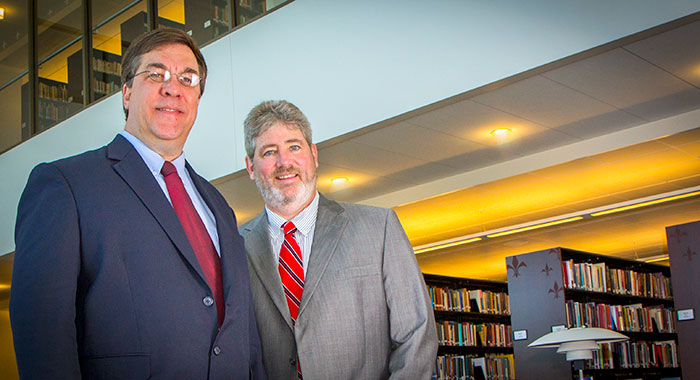New Deans Braced for Distinction
The first two dedicated schools on campus will be driven by excellence fueled by community partnership, say their founding deans. With the appointments of Dr. Matt Hunsaker (Medical College) and Kevin Quinn (Schneider School), leadership is in place for a new chapter in college history. The men will serve as founding deans for the new Medical College of Wisconsin’s Green Bay area campus and for the Donald J. Schneider School of Business & Economics announced earlier this year.
Hunsaker, formerly director of the Rural Medical Education Program at the University of Illinois College of Medicine, began his career in family medicine. He relishes the charge toward creativity and innovation that comes with his new position: “You know every innovation of the program will evolve; it’s not simply duplication of last year’s efforts. Mix in a little bit of audacity, a little creative thinking and you can actually develop the program beyond where things are.”
And Quinn, who joined the St. Norbert economics faculty 20 years ago and most recently served as associate academic dean, says: “It’s fun knowing that every decision you make is the first one of its type for your organization. We want to make sure that we get the feel of a St. Norbert education and the St. Norbert experience right. The DNA has to be St. Norbert DNA.”
The two appointments, coming just months apart, signal the increasing richness of the St. Norbert experience. Next year’s incoming first-years intent on a liberal arts education will rub shoulders with medical students; undergraduates majoring in business and economics will learn in an environment that supports a new MBA program now in the process of securing accreditation.
“Thematically, I’m excited,” says Hunsaker. “It is the focus on developing the physician/clinician that is relevant demographically, connected to the community and has all the important skills of empathy, compassion, listening … all of which are part of the community here. Being embedded here, as part of the campus, is a good thing.
"Our work in training medical students will be more than just in the community, it will be of the community. The community’s not a destination: members of the community are really part of the entire enterprise of building a medical school. Green Bay has a long history of working together towards community goals. That’s one of the things that was attractive to me. It’s not a community that has never succeeded. It’s a community that’s worked hard, whether it’s for professional sports teams or community outreach – the community has come together for important projects."
July 9, 2014












